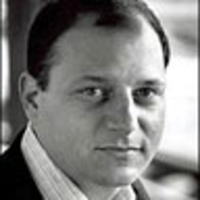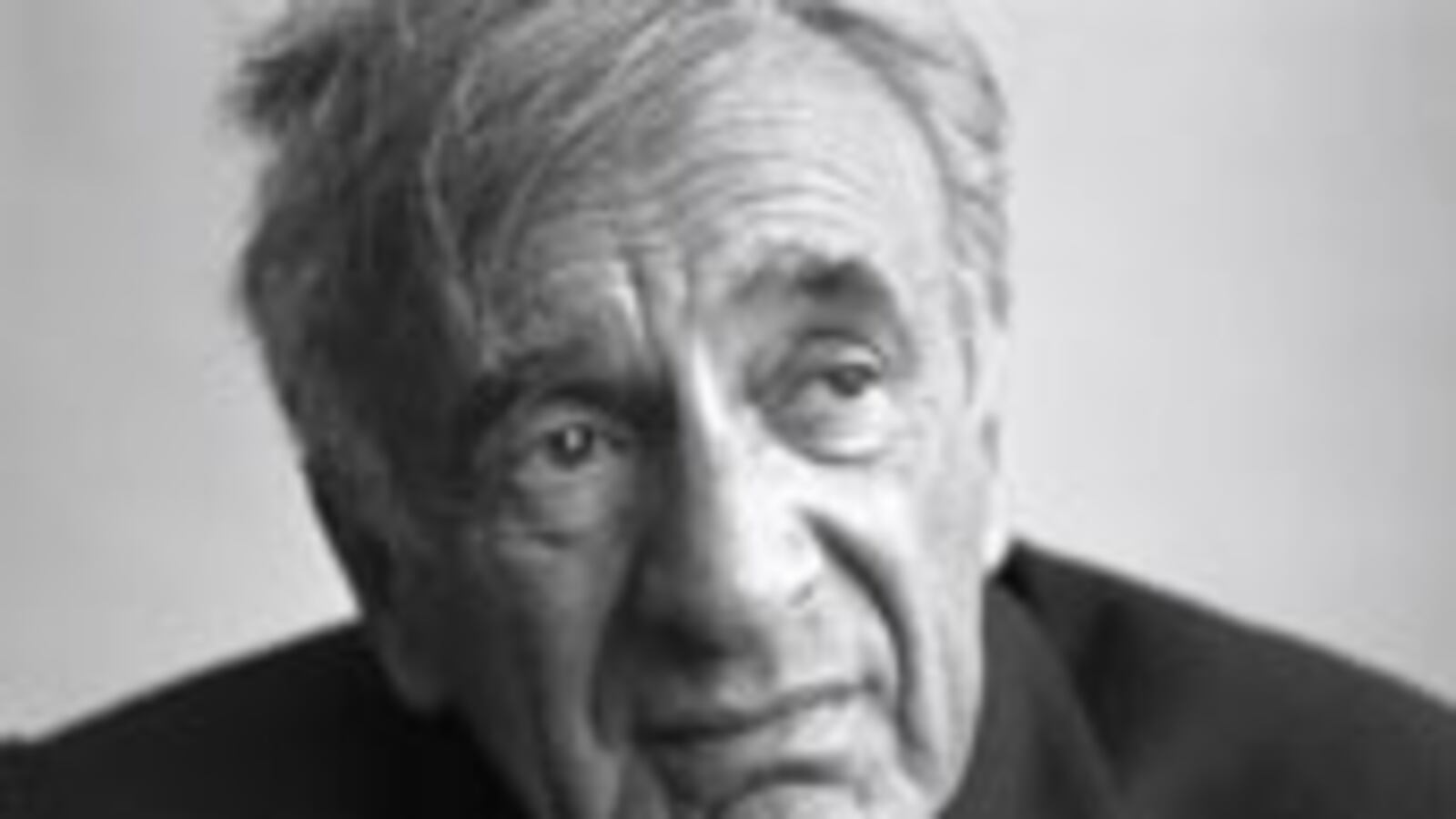
"I will become militant. I will teach, share, bear witness. I will reveal and try to mitigate the victims' solitude," wrote Elie Wiesel in his memoir, And the Sea Is Never Full. As an author, activist, and public intellectual, Wiesel has done all of these things and a good deal more. On the occasion of Tuesday’s Holocaust Remembrance Day, The Daily Beast spoke with Wiesel about his rejection of the term “the Holocaust,” the difficulty he faced finding a publisher for his now-classic book Night, and how one should commemorate the murder of nearly six million Jews.
Perhaps you can begin by reminding readers of your background.
When my father was born, it was part of the Austro-Hungarian empire. When I was born, it was Lithuania. When I left, it was Hungary. It is difficult to say where I come from. Historically, I come from Jewish history. I had the classic upbringing in the Yeshiva, learning, learning, and more learning.
As I’m sure you know, in Lithuania the Hungarians were the last to be deported. They were the last community and I am angry that they were the only community that couldn’t be saved. Literally, they were the only community that couldn’t be saved, Hungarian Jews.
Nobody told us [that the Jews would be deported]. If they had, in my case, my father surely would have followed the urgings of our maid, a marvelous English lady. She told him, “come to the mountains and I’ll take care of you.” But we didn’t know. Five-hundred-thousand or more, much more, were deported in six to eight weeks, and close to 500,000, were killed. Gassed and burned in that small period.
I was deported at the end of May 1944. When we arrived at Auschwitz, my father looked out the window, a small hole in a cattle car, and saw the name Auschwitz and didn’t know what it meant. That’s really what happened to us… We were eventually liberated by the American army and then I came to France. That’s more or less the beginning.
The word “holocaust” is interesting in itself. Explain for you what it means.
I think I was one of the first, if not the first, to use it publicly [to describe the murder of six million Jews during World War II]. I’m sorry, but I regret it now, because there are no words. I did it because strangely enough I was working on a text on the sacrifice of Isaac. The word itself means a burnt offering. It’s a good word because it ends with fire. A total burning. A burnt offering. But of course why I feel bad about it is because it has a religious connotation and there are no words. So if I have to speak about [the Nazis’ attempts to destroy European Jewry] today I don’t use it. I prefer not to. I use the word “Auschwitz” instead. The name “Auschwitz” should be the one in the conscience, or whatever, that people need to remember.
So you really don’t use the word?
Rarely.
A lot of young people are introduced to the Holocaust through Night. I’m interested in what the reception was when you first wrote the book and tried to get it published. Now it’s such a classic book here in America. What was the initial response?
The agent in New York brought it from one publisher to another. With great refusals. He couldn’t find a publisher. He showed me letters once from famous publishers saying why they wouldn’t accept it. Some said it was too sad, others said it wouldn’t sell. One of them was from the publisher of Knopf! Finally, Hill & Wang gave us an advance of $100.
What year was that?
It came out in 1960. The first English edition came out in London in 1959, I think. Bantam [the eventual paperback publisher] sold six million copies in 20 years. This is the story.
How have you felt about more recent representations of the Holocaust in popular culture? Like the recent film The Reader? Does a writer or filmmaker have a unique obligation when dealing with this subject matter?
For a long time, you’re too young to remember, they had a Holocaust series in America. They said “This is a definitive documentary” and The New York Times asked me to review it. So I went over to see the screening. This was before seeing the horrible advertisements. Horrible at the time. You shouldn’t have advertisements during the film, but they did. They spoke for instance about the gas chambers, then had advertisements on bread! Or exterminators! The most indecent things for this film. I saw it, and said—I was waiting to write “Song of Songs”—finally four times, the whole series, I saw it. It was cheap, kitsch, and so many mistakes. I remember the most obvious was that at one point they showed a wedding, and they had classical music and a rabbi. You know, we Jews have so many prayers for every single situation. So, there is a prayer when you go to read from the Torah. The rabbi recited the wrong prayer! Something so silly, but it is indicative. I just can’t write a negative review. So I called The Times. I said, “Look, I’m too close, I cannot do it.” The editor then said to me, “If you don’t do it nobody will dare.” So I wrote the review, but again said to myself, “Why should I be the one to do it?” I wanted to call it back. It created an uproar. A whole page of letters.
I don’t like docudramas. Documentaries should not go together with fiction, or half-fiction or quarter-fiction. The two should not go together. They cannot mix. I saw The Reader. The truth is, they came to see me and I said, “In my view, it is not a movie on the Holocaust. It’s about Germany.” What it shows is a young man who made love to a woman, and the only person he felt sorry for was the woman! I said to them, “Look, I occasionally have people in my classes who come from Germany to complete a PhD and so forth." They’re taken in by my other students with such tenderness because they feel sorry for them because they feel guilty and they shouldn’t. So we embrace them. But when they go back, they involve themselves in all kinds of human-rights issues. Fighting fanaticism, fighting anti-Semitism. Some of them go to Israel, but this guy… It may be Germany, but it’s not the Holocaust.
Can you think of any popular depictions of the Holocaust that have changed our view of what actually happened? Has our view of the Holocaust changed over the years?
I remember years ago, I said something in a speech that shocked everybody. I said, “If all the survivors of 1945 could have met in an enclave between two mountains and made a vow not to speak about it, their silence would have had a greater impact than everything that has been said and written." But they didn’t do it, it couldn’t be done. Does it mean that we know more about it? No. I still believe that only those who were there know what was like being there. I still believe that language fails. We cannot find the words. I still believe that. What we do have now is more information. There are tremendous works. But between information and knowledge, as you know, there is a big abyss. One who writes, you know. How to turn information into knowledge, that is the question.
How does one do that?
We need grace. The grace of God or something. Surely commitment to truth.
Do you write in French?
All my writing is in French.
You don’t write in Yiddish?
Occasionally I do. Just to show my sentimental attachment. Just for that. It was my language.
What is appropriate for us to be thinking about on Holocaust Remembrance Day?
I try to remain silent. Then to think of those, if you were there, those closest to you. And then, the invisible becomes visible. A great theologian once said, “The dead are simply invisible, but they are not absent.”
Jonathan Mahler is the author of The Challenge: Hamdan v. Rumsfeld and the Fight Over Presidential Power and the bestselling book Ladies and Gentlemen, the Bronx Is Burning. Mahler is a contributing writer for The New York Times Magazine, and his work has also appeared The New York Times Book Review, New York magazine, The New Republic and Slate, among other publications.





